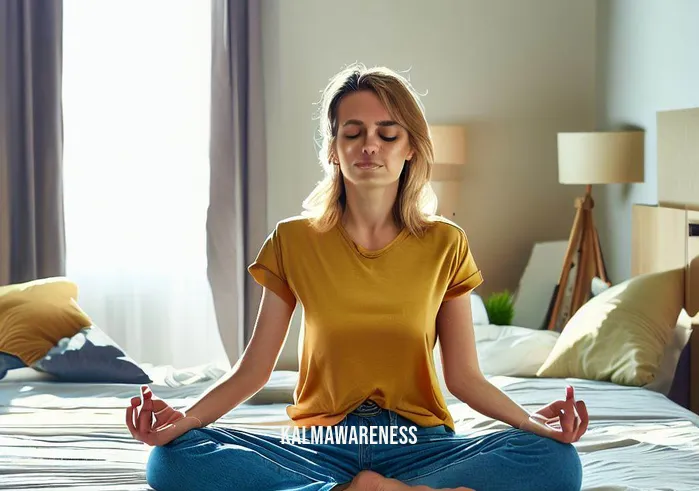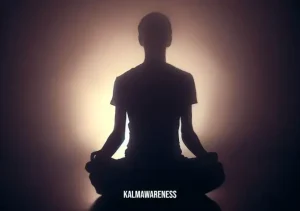Can I Meditate in Bed? Exploring the Nexus Between Mindfulness and Restful Sleep
The Intersection of Meditation and Sleep
The question, “Can I meditate in bed?” is one that pops up frequently in conversations surrounding relaxation, sleep, and mindfulness. If you’ve found yourself pondering the same thing, you’re not alone. Many people have questions about how best to incorporate mindfulness into their nighttime routine to enhance both the quality and duration of their sleep.
What is Mindfulness?
Mindfulness is the practice of being present in the moment. It involves attaining a peaceful state of mind in which thoughts are not occupied by worry. Various techniques are used in mindfulness practices, including focused attention, breath awareness, and body scanning, among others. While meditation is commonly seated, it’s not unusual to explore mindful movement in other forms such as yoga or even walking, to boost the quality of sleep.
The Need for Relaxation Before Bed
The importance of a good night’s sleep cannot be overstated. Studies have shown that consistent, quality sleep is essential for overall well-being, cognitive function, and emotional stability. Yet, with the stresses and stimuli of modern life, achieving this has become increasingly difficult for many. Some try to relax by reading, others indulge in a 15-minute power nap, while some even engage in light physical exercises. Meditation is another tool in this arsenal that has been proven effective for both relaxation and better sleep.
Can You Meditate in Bed?
The short answer is, yes, you can meditate lying down. This form of practice, often referred to as supine meditation, has its merits, especially for those who find sitting for extended periods uncomfortable or for individuals who are bedridden for medical reasons. However, there are considerations to keep in mind.
Body Posture: Unlike traditional seated meditation, supine meditation places you in a more relaxed physical state. This is beneficial for those who have body pain but could also cause drowsiness.
Risk of Falling Asleep: Meditating in a lying down position increases the likelihood of falling asleep, which isn’t necessarily a bad thing if your aim is to transition smoothly into a restful sleep.
Setting: Just as you would in a seated meditation, the setting is crucial. Creating a calm atmosphere with low lighting can help facilitate a deeper meditative state.
Techniques and Approaches
Various techniques can be employed while meditating in bed. For instance, EMDR meditation focuses on eye movement to process traumatic memories and can be done lying down. Body scanning techniques, like the practice of directing your focus to touch that body part, can also be a useful element of some meditation exercises.
Jack Kornfield’s Meditation for Beginners could offer you some insightful ways to start if you’re new to the practice. Many of these techniques are designed to be simple and straightforward, perfect for integrating into a bedtime routine.
“Meditation is not to escape from society, but to come back to ourselves and see what is going on. Once there is seeing, there must be acting. With mindfulness, we know what to do and what not to do to help.”
– Thich Nhat Hanh
Breath Focus and 256 Hz Benefits
Among the most effective techniques to employ when meditating in bed is focusing on your breath. There are even specific frequencies like 256 Hz that can potentially bring about specific benefits, although more research is needed in this area.
In Summary
So, can you meditate in bed? Absolutely, but understanding the purpose of your meditation and choosing appropriate techniques are key. Whether you are a teenager walking the path of mindfulness or someone who’s well-versed in mindful practices, meditating in bed can be a rewarding experience.
Interested in finding out how to incorporate meditation into a sustainable self-care routine, or how to stabilize your meditation practice for long-term benefits? Continue reading to find out more.

The Mechanics of Bedtime Meditation: Why ‘Can I Meditate in Bed’ Is a Question Worth Exploring
Understanding the Depth of Bedtime Meditation
While we have established that meditating in bed is feasible, let’s explore its nuanced mechanics and the various methodologies that can enhance this unique practice. As our lives become increasingly busy, it’s essential to recognize the value of meditating in bed, whether it’s to gain mental clarity or prepare our bodies for a restful night. This practice is more than just lying down with closed eyes; it’s about connecting mindfulness to the very space where we seek daily respite.
Varied Approaches to Bedtime Meditation
It’s worth noting that not all bedtime meditation techniques are created equal. Depending on your goals—be it sleep, relaxation, or mindfulness—different methods can offer varying benefits. Here’s a look at some notable approaches:
- Mindful Hypnobirthing: Although generally designed for expectant mothers, the techniques are all about calming the mind and can be adapted for bedtime relaxation.
- Rouse Yoga: While it might seem counterintuitive to think of yoga before bed, specific gentle poses and stretches can prepare your body for sleep.
- How We Get Deep So Fast: This method focuses on rapid deepening of the meditative state, ideal for those who struggle to ‘switch off’ at night.
Techniques to Keep in Mind
When asking, “Can I meditate in bed?”, it’s crucial to keep in mind the techniques you want to employ. Opting for a mix of sustainable self-care practices, like incorporating judgement of the wise in decision-making, can round out your meditation practice.
Comparing Bedtime Meditation Techniques: A Table Overview
| Technique | Primary Objective | Ease for Beginners |
|---|---|---|
| Mindful Hypnobirthing | Calmness and mental clarity | Moderate |
| Rouse Yoga | Physical relaxation | Easy |
| How We Get Deep So Fast | Rapid entry into deep meditative state | Advanced |
| Judgement of the Wise | Enhancing decision-making | Moderate |
| Sustainable Self-Care | Long-term mental health | Easy |
The Convenience Factor
The comfort and convenience of meditating in bed make it especially appealing. You’re already in a place of rest, removing the need for additional preparations like setting up a separate meditation space. This comfort can be particularly beneficial for teenagers, as they can integrate meditation effortlessly into their routines before sleep.
Advancing Your Practice
A common misconception is that meditation is solely a beginner’s practice, something you do only to start or end the day. However, meditation can be as simple or as complex as you make it, and those looking to deepen their practice might find benefits in dedicating specific bedtime sessions for different types of meditation. By doing so, one for each blessed day can make a significant difference in your overall well-being.
In Summary
So, when you ponder the question, “Can I meditate in bed?” not only is the answer a resounding ‘yes,’ but the practice also offers a plethora of options tailored to your needs. Whether you are a beginner or looking to advance your practice, bedtime meditation can be a valuable addition to your daily routine.
Eager to discover how to make this practice a seamless part of your life, or perhaps you’re curious about specialized techniques for stress management? Continue reading to unveil the next layer of this fascinating topic.
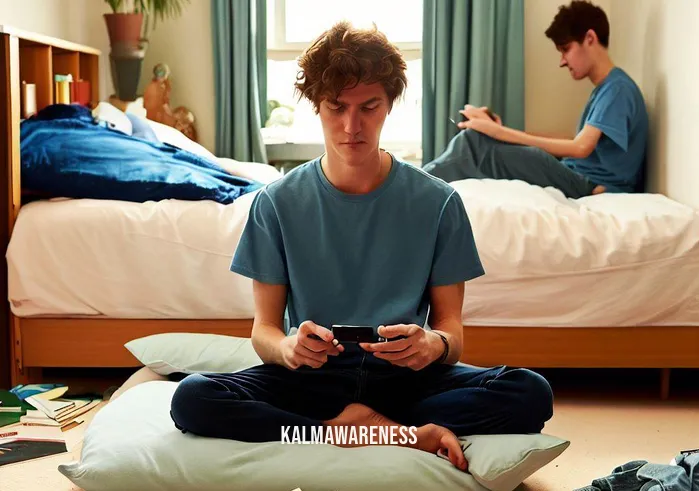
Transformative Moments: How Meditating in Bed Can Inspire Hope and Clarity
The Essence of Hope in Mindful Practices
Meditation, by its very nature, is a journey inward. It enables us to find hope in the stillness, clarity in the quiet, and inspiration in the seemingly mundane. When asking the question, “Can I meditate in bed?”, you’re opening a door to a sanctuary where the mind can rejuvenate, much like the body does during sleep. These transformative moments can fill your life with hope, paving the way for brighter days ahead.
“In stillness, the world resets.”
The Resilience Found in Stillness
When you incorporate bedtime meditation into your daily routine, you’re not just working towards better sleep or a calmer state of mind; you’re cultivating resilience. This is especially important for those moments when life becomes chaotic. As the saying goes, “If you can’t change the circumstances, change your perspective.” Meditation helps in altering that perspective, allowing us to see situations in a different light.
“You have within you right now, everything you need to deal with whatever the world can throw at you.”
– Brian Tracy
Simple Techniques with Profound Impact
If you’re looking for inspiration and hope through bedtime meditation, consider using meditation made simple techniques that are easy to follow and effective. These straightforward practices can add layers of depth to your bedtime routine, encouraging a life imbued with mindfulness.
Bringing Inner Wisdom into Bedtime
As we discussed in previous chapters, bedtime meditation techniques can range from Mindful Hypnobirthing to complex practices designed to bring deep states of meditation rapidly. The beauty lies in the fact that these practices are not mutually exclusive; you can combine different methods to suit your needs.
To add a dimension of wisdom and depth to your practice, you can employ techniques like the “Judgement of the Wise.” This involves deep contemplation and reflection as part of your meditation practice.
“Your vision will become clear only when you can look into your own heart. Who looks outside, dreams; who looks inside, awakes.”
– Carl Jung
Inspiration for All Ages
Whether you’re a curious teenager or a seasoned adult, the practice of meditating in bed can be an endless source of inspiration. It’s about taking those few moments to breathe deeply, clear your mind, and remind yourself of what’s truly important. The practice of EMDR meditation can be particularly beneficial for young adults, as it allows them to process complex emotions and thoughts, leading them toward greater mental stability.
Unlocking the Inspiration Within
What makes the question, “Can I meditate in bed?” so transformative is its ability to unlock the inspiration already present within you. At the end of a long day, it’s an opportunity to review your actions, thoughts, and feelings. By focusing on your breath or by repeating a mantra, you enable yourself to discover new layers of understanding.
“You are enough just as you are. Each emotion you feel, everything in your life, everything you do or do not do… it’s all okay. You are an incredible human being.”
– Unknown
In Summary
The question, “Can I meditate in bed?” holds more weight than it appears. It’s not just about the act of meditating, but also about the hope, clarity, and resilience that such a practice brings into your life. Meditating in bed isn’t merely a habit; it’s a transformational experience that offers solace, brings hope, and cultivates wisdom, one mindful breath at a time.
So, what’s next on this journey? Would you like to discover how to make meditation an integral part of your lifestyle, including specific tools and techniques for holistic well-being? Continue reading for the answers that could reshape your approach to mindfulness and meditation.
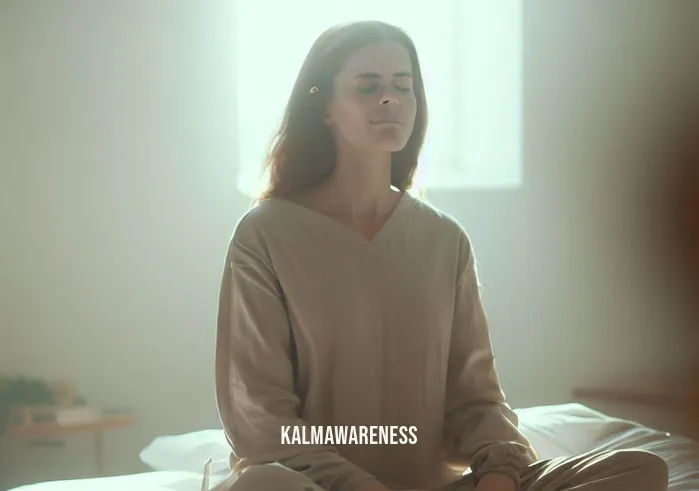
The Anatomy of Bedtime Meditation: A Closer Look at Meditating in Bed
Why Meditating in Bed Deserves Attention
The idea of meditating in bed seems inviting, a sanctuary away from the hustle and bustle of life. Yet, some questions inevitably arise. Is it effective? What are the intricacies involved? And most importantly, can you really meditate in bed in a way that brings about the desired benefits of meditation? The focus here is to answer these questions, helping you understand the “why” and the “how” of meditating in your cozy retreat.
The Benefits of Bedtime Meditation
Many of us associate bedtime with rest and sleep, overlooking its potential as a time for meditation. But meditation at bedtime can offer:
- Improved Sleep Quality: Meditation helps your mind to focus and discard the day’s anxieties, preparing it for restful sleep.
- Emotional Balance: Fostering self-awareness can help stabilize your emotions, as studies have shown.
- Enhanced Mindfulness: Making meditation a nightly ritual can deepen your mindfulness practice, impacting your waking hours as well.
“The quieter you become, the more you can hear.”
– Ram Dass
Bedtime Meditation Techniques: A Breakdown
Let’s delve into some techniques that can specifically suit bedtime meditation. Here’s how to add an element of mindfulness to your nighttime ritual:
Breathing Techniques: Simple breathing methods like the 4-7-8 technique can not only help you fall asleep but also ensure you get a night of quality rest. Breathing and meditation share a symbiotic relationship that can lead to a peaceful state of mind.
Mindful Movement Sleep: A low-energy, calming activity like mindful movement sleep can prepare the body for both sleep and meditation.
Sustainable Self-Care: Incorporating meditation into your bedtime routine is a form of self-care that is easy to maintain, thus ensuring long-term benefits.
Power Nap Meditations: 15-minute power nap meditations can also be a great way to rejuvenate the mind quickly, especially if you meditate right before a short nap.
| Technique | Time Required | Primary Benefit |
|---|---|---|
| Breathing Techniques | 5-10 minutes | Stress reduction |
| Mindful Movement Sleep | 10-20 minutes | Prepares body for sleep |
| Sustainable Self-Care | Ongoing | Long-term emotional balance |
| Power Nap Meditations | 15 minutes | Quick mental rejuvenation |
Mindfulness for Different Age Groups
Whether you’re a teenager looking to explore new ways of relaxation or an adult aiming for better work-life balance, meditation in bed can serve as a versatile tool for different age groups.
For Teens: Incorporating walking meditation techniques, especially designed for teenagers, can be effective. It adds an active aspect to the otherwise still practice.
For Adults: Mindfulness for adults can involve more complex practices like Rouse Yoga, which can be adapted for bedtime routines to build physical and mental resilience.
For Seniors: The practice can focus on simple breathing exercises and lighter activities, making meditation in bed a practical choice for older adults.
The Road to the Final Chapter
As we’ve seen, the layers to the question of “can I meditate in bed” are diverse and filled with possibilities. From tailored techniques to benefits for all age groups, the options are many, allowing you to select the best practices for your individual needs.
Our journey of exploring bedtime meditation is nearing its end. As we prepare to transition to our final chapter, prepare to dive into actionable ways to make meditation an inseparable part of your bedtime routine, enhancing your overall quality of life. Trust us, you won’t want to miss what comes next.
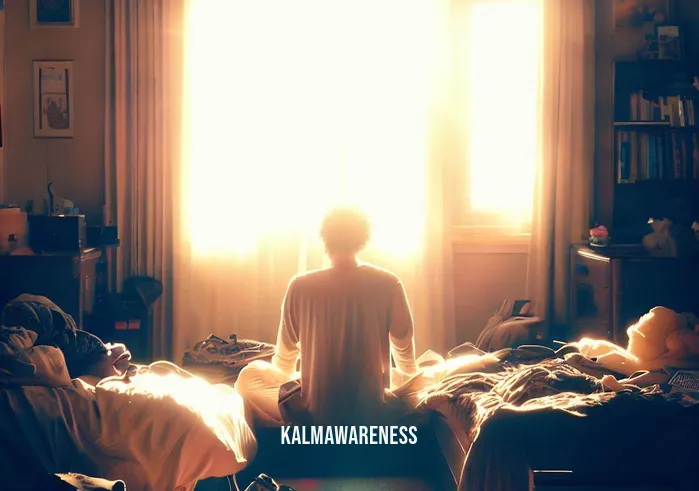
The Final Pillow: Sweet Dreams and Meditative Moments in Bed
Embracing the Concept: Why Meditation in Bed Matters
As we wrap up this enlightening journey through the world of bedtime meditation, let’s reflect on the significance of meditating in your sanctuary—your bed. We’ve explored its multifaceted benefits, from achieving emotional balance to enhancing mindfulness and even how it benefits different age groups. In this final chapter, we’ll pull everything together to appreciate how you can cultivate peace, stability, and even a touch of wisdom right from the comfort of your bed.
Savor the Everyday Blessings
So, how can you tie it all together? Make meditation an everyday event, one for each blessed day, if you will. Don’t just think of it as an isolated practice; see it as an integral part of your lifestyle, a form of sustainable self-care.
“You should sit in meditation for twenty minutes a day unless you’re too busy; then you should sit for an hour.”
– Old Zen Saying
EMDR and Other Forms of Meditative Self-Care
EMDR (Eye Movement Desensitization and Reprocessing) meditation is an innovative approach that has been gaining attention lately. EMDR not only helps in stress reduction but also plays a vital role in stabilizing emotional upheavals. And guess what? You can integrate it into your bedtime meditation routine.
How to Keep Going
We often encounter hurdles in our practices, not just in meditation but in any new endeavor we undertake. The key is to keep in mind the definition of our goal, to maintain focus, and to allow for flexibility in our methods. That’s what keeps us on the path.
Call to Action: Your Next Steps
- Review Previous Chapters: If you’re still grappling with certain aspects, revisiting earlier sections may provide clarity.
- Join Our Community: We offer an array of resources, from articles to webinars that expand upon topics like mindful hypnobirthing, 256 Hz benefits in meditation, and much more.
- Share Your Story: We’d love to hear your experiences and how the practice of meditation in bed has influenced your life.
- Explore More: While we touched upon an array of techniques, there’s more to discover, such as deepening your practice to understand how we get deep so fast in meditation.
A Gracious Farewell
We’re incredibly grateful that you joined us on this enlightening journey, diving deep into the question of whether you can meditate in bed and how to go about it most effectively. We hope you’ve found the insights valuable and that they’ve armed you with the tools you need to create a mindful bedtime sanctuary.
“Peace comes from within. Do not seek it without.”
– Buddha
And remember, this is only the beginning. Our magazine is filled with more illuminating articles that can further enrich your journey towards peace, relaxation, and mindfulness.
Thank you for being a part of our community. We look forward to delivering even more insightful content in our future editions. Until then, may your nights be serene and your mornings be refreshed, thanks to the newfound joys of bedtime meditation.
So, go ahead and indulge in some bedtime mindfulness tonight. After all, the best part about this journey is the freedom to customize it to your needs. Your sanctuary is just a meditation away. Sweet dreams!
